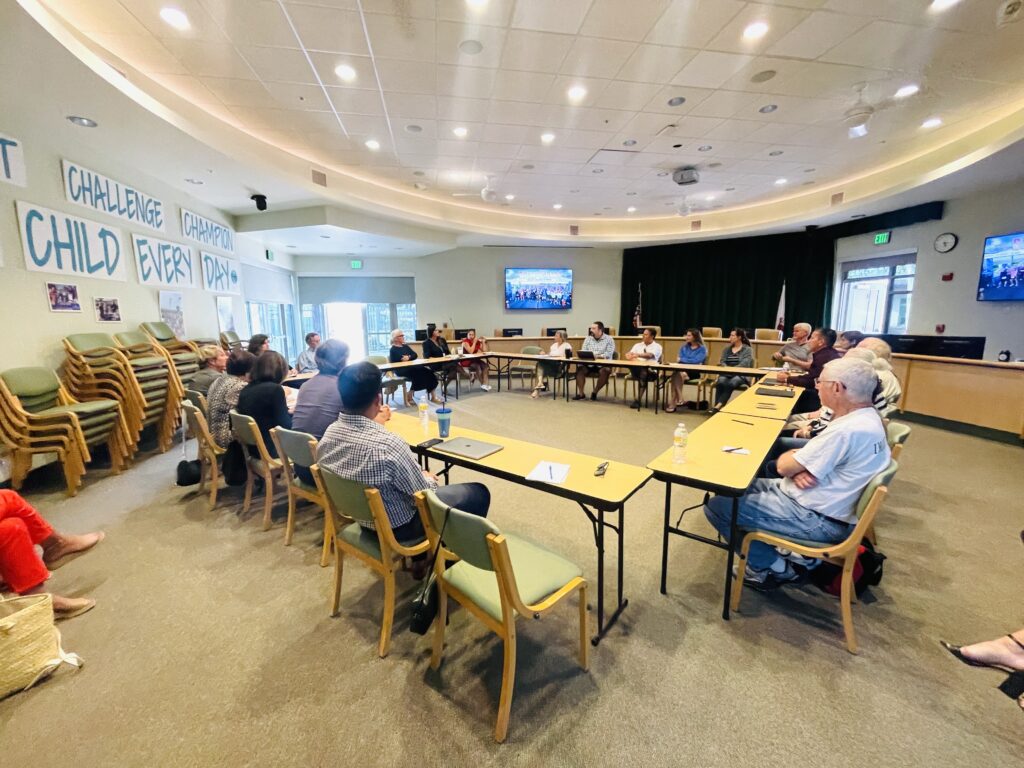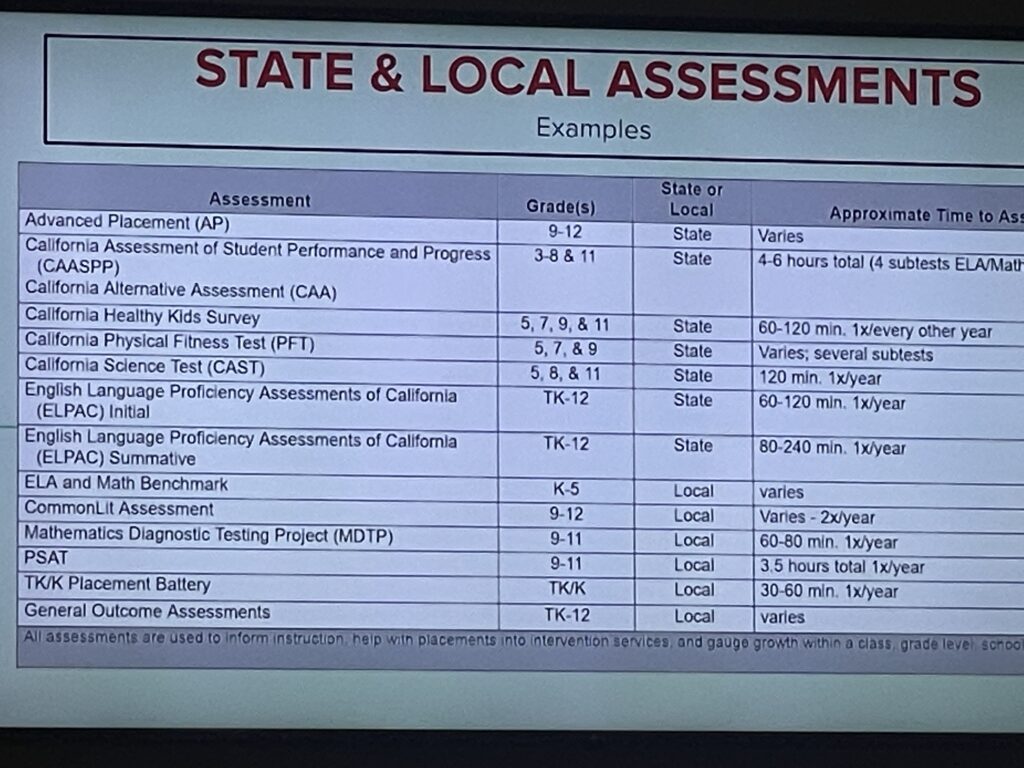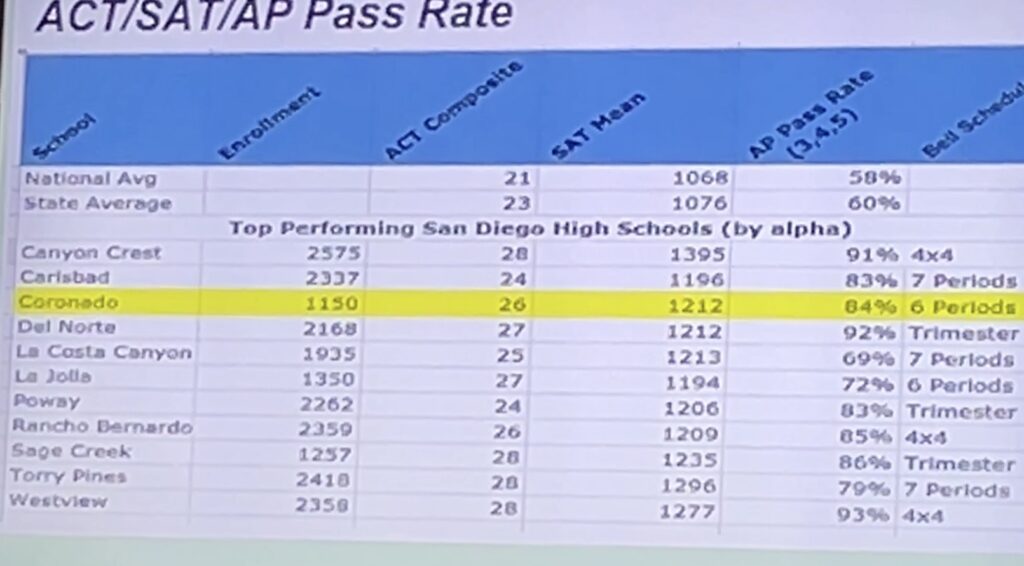The Coronado Unified School District hosted its first-ever community forum on post-pandemic academic achievement on Tuesday, April 26th from 5-6pm. About 30 community members gathered at District Offices to learn more about how the district is helping struggling learners with CUSD Director of Learning, Dr. Megan Battle, the lead expert on the topic.
Dr. Battle, along with Superintendent Karl Mueller, presented data and information to help answer more than a dozen questions submitted by community members. (Members were required to submit questions via an online link prior to the meeting, and administrators shared that they would not address questions that were not linked directly to student academic achievement to keep the conversation on topic.)
“The district recognizes that there is a lot of community concern about academic disruption as a result of the pandemic,” said Maria Simon, CUSD Public Information Officer, prior to the meeting. “This forum is an opportunity, in a more casual setting, outside of a board meeting, to invite the public to hear first-hand from the CUSD Learning Department.”
Board President Esther Valdes-Clayton opened by saying that parents and board members are partners in education, with the parents directing the governing board to do what is best for the kids.
“I am looking forward to hearing Dr. Megan Battle’s presentation, because we have a plan. We have metrics. They are measurable. It’s data-based. It’s quantitative. And we want to want to answer all your questions and we want to listen too, because we know we can do better,” said Valdes-Clayton.
Superintendent Mueller said that increasing academic achievement after COVID isn’t going to happen overnight, and that none of it will be adequately captured in a one-off assessment at the end of the school year that only targets certain grade levels in two school subjects.
“For example, the CAASPP results, they are a snapshot in time for three years, that doesn’t even target every student and every grade level. The responsibility of our teachers is much greater than that. It’s to find out where they are on day one, then come up with a plan to get them at or above grade level by the end of the school year,” said Mueller.
Mueller said there is “no magic bullet” when it comes to getting to pre-pandemic academic levels. Students have suffered learning loss, just as they do every summer, according to Mueller.
“Learning loss is something that has been widely studied and applied in public education, decades before the pandemic, so we already have a lot of these systems in place,” said Mueller. “But what we have to do is strengthen these systems and add new systems and interventions and resources for our students to get at, or above grade level, at a pace that is comfortable to them.”
Mueller also shared that, as always, the first thing to help a struggling learner is for the parents to reach out to that child’s teacher or teachers. They know the student best and can help advise on support options.
In order to answer community questions about data and metrics, Dr. Battle shared a breakdown of state and local testing measures which included a list of at least 12 different assessments. This list includes everything from high school AP exams to California Assessment of Student Performance and Progress (CAASPP), the California Science Test (CAST), English Language Proficiency Assessments of California (ELPAC) Mathematics Diagnostic Testing Project (MDTP) and more.
Newer tests such as the CommonLit Assessment have been added with COVID money to identify which students are high performers on a particular standard and which students may need more support or intervention, according to Dr. Battle.
She also shared more info about district’s Multi-Tiered Support Systems (MTSS) which determines how kids will receive support. Dr. Battle said that research has shown that 80% of kids will be successful for what they get in Tier 1, but other kids might need more help.
“So that may be a pullout support, for 30 minutes a day, or another extra-small group in the classroom or individual support,” said Dr. Battle. “Or it could be an extra class…at middle school and preschool we have academic support classes.”
But she emphasized that helping students excel academically after COVID is a moving target and the district is always looking to make changes and improvements.
“Because of the pandemic, we have put a lot of thought into finding out if these supports are working. And what other curriculum support resources can we add? So we really honed in on figure out targeting the best intervention supports and growing those supports,” said Dr. Battle.
For example, she shared that she met with elementary school teachers and special education teachers last week, and the conversation was focused on assessments. They learned that the district does not currently have a great universal screener at that level. The district is now putting one in place.
“We are still being proactive and figuring out how we can always make our system better and learn more about our kids, especially coming out of the last two years,” said Dr. Battle. “It was always a goal of ours, and now we’ve accelerated that goal, and we have funding to buy a program.”
When it comes to students who have underperformed on the CASSPP test, Dr. Battle shared that there are several support options in place. These include Summer 2022 academic opportunities (summer school), adding Tier 2 and Tier 3 supports to student schedules, other multi-tiered supports and counseling support.
In response to another question from another community member, Dr. Battle shared what extra academic resources and supports have been implemented to help students with literacy and math, and described the process for identifying students in need of extra supports. The solution involves identifying the students in need with the aid of formative and summative data and educational partner input, then providing the extra supports the student needs, which could include extra small group or individual supports, support classes, etc. The district also offers tutoring with the aid of students in the National Honor Society.
Mueller then spoke to two other questions in relation to the 4×4 bell schedule. The first question asserted that the 4×4 was a “failing” curriculum. He shared a slide that the numbers show that students have been, and can be, successful on an AP exam with a 4×4 or trimester schedule. He presented a slide comparing schools with AP pass rates and ACT/SAT scores, and the type of bell schedules with other similar schools.
He also presented a slide showing that, even though the 4×4 has been in place for less than one year, the D and F list is already on the decline. Mueller reiterated that there will be an extensive 4×4 report the next school year with updated data.
Earlier in the evening, Mueller said that every child is “a different story” and that it’s the responsibility of the teachers to assess the students, identify gaps, create goals and come up with a plan to help the student move forward.
Mueller also warned parents that if they are approaching their children with a deficit mindset, they aren’t setting their child up for academic success.
“If you tell your child you are way behind in math, you are way behind in reading, you’ve already deflated that kid. You are know having to build up that child’s self esteem so they are willing to get back on the treadmill and start building their mileage back up,” said Mueller. “We can’t have the message from the community, our governing board, our teachers, our school district be, ‘we are all in a lot of trouble because all of our kids are behind.’ That’s defeatist. Our kids need to know, we believe in you, and we are going to create supports and the conditions by which you as an individual will be successful.”
This article will be updated with a link to the presentation when it’s posted on the district website. The next school board meeting takes place on Thursday, May 19th at 4pm.
According to administration, the announcement for this forum was included in the district weekly newsletter on April 22, 2022, with 1,014 visitors viewing the newsletter. It was placed on the district website on the announcement feed that is also published on the mobile application. It was also posted to the district Facebook page.







